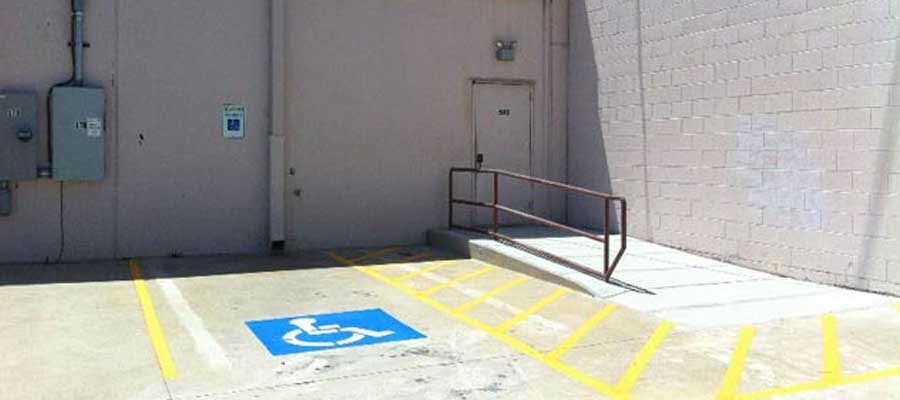
Handicap ramps provide access from a walkway, sidewalk, or another surface to a doorway, walkway, or sidewalk that sits at a lower or higher level. Buildings with raised or lowered access points must provide ramps for those in wheelchairs to be able to reach them. A handicap ramp may exist in addition to a stairway, as someone in a wheelchair or using another wheeled device would not be able to climb stairs.
Residential structures may also include handicap ramps when someone living in the home uses a wheelchair or another wheeled device regularly. Such a ramp can be installed leading to the front or back door, providing access to the interior of the living space. In order to meet ADA regulations, a handicap ramp must:
- Have a maximum slope of one inch of rise for every 12 inches of length (4.8-degree angle or 8.3% grade).
- Measure 36 inches in width (at the minimum, although 48 inches is ideal).
- Include a two-inch lip or curb along the interior edges of the ramp surface.
If possible, the end of the deck where the ramp meets the lower or higher surface should be beveled to ensure a smooth entry point for the user. If the surface cannot be beveled, the end of the deck could be made of a sheet of smooth steel, which can span the space between the driveway or walkway and the surface of the ramp. At the top of the ramp, a level platform measuring at least five feet by five feet should be installed for the maneuvering of a wheelchair.
Handicap RAMPs REPAIR PROCESS
If damage occurs to a handicap ramp, individuals who rely on the ramp to get to an access point or transfer between surface levels may not be able to use it. Cracks in the material used to construct the ramp can restrict hand-powered wheelchair users from maneuvering over the damaged section. Significant damage can also change the level of the ramp, creating a safety hazard for those using it.
If a handicap ramp is made of concrete, the team at NTS Contractors can perform a repair. The extent and location of the damage will determine whether the section can be repaired. The technicians who work on handicap ramp repairs can assess the damage and provide a cost-effective repair, rather than tear out and replace the entire concrete ramp.
WHY NTS CONTRACTORS For All Your Handicap Ramp Needs?
As mentioned, handicap ramps are required in many commercial structures. NTS Contractors works with clients on many buildings, including apartment complexes, multi-family residential facilities, office buildings, warehouses, industrial facilities, and restaurants.
Handicap ramps provide access to those who struggle with mobility challenges, so addressing any necessary repairs as soon as possible is essential. For more information about handicap ramp repairs or other concrete services, contact NTS Contractors.